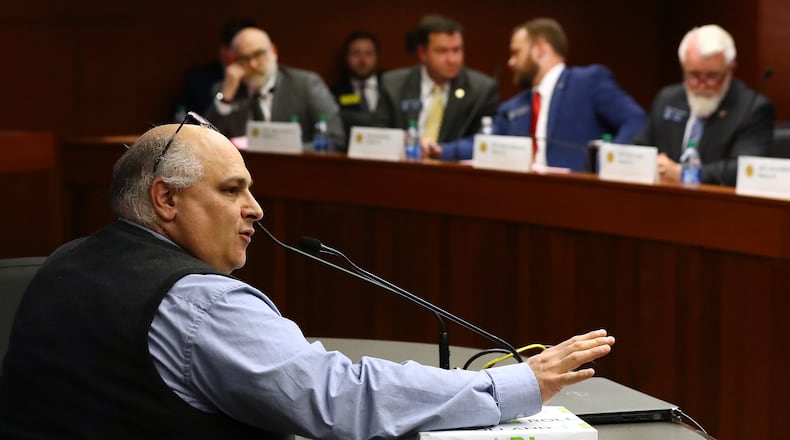Joel Natt dropped a thick ream of blank paper in front of state senators to demonstrate how onerous new ballot-tracking requirements might be for election workers.
“My county will have to put a minimum of three security stickers on each one of these packets,” said Natt, the Republican vice chairman for the Forsyth County elections board. “Think how much paper I have to order for every election. ... You’re going to waste time, and you’re going to cause me to lose poll workers.“
A crowded room of county election officials, voting rights groups and election integrity advocates testified Monday against Georgia’s voting bill, a Republican proposal that could soon receive a vote in the Senate Ethics Committee, putting it on track for final votes within days.
The 39-page bill would require paperwork and seals for blank and completed ballots, empower the GBI to investigate elections, allow the public to inspect paper ballots and restrict election donations from nonprofit organizations.
Credit: Curtis Compton / Curtis.Compton@
Credit: Curtis Compton / Curtis.Compton@
Joseph Kirk, election supervisor for Bartow County, said additional chain-of-custody procedures such as seals and transfer forms would be counterproductive when election workers are inside a secured room.
“There are two kinds of security in elections: There’s real security that we need, and then there’s security theater,” Kirk said. “All it really does is make folks feel better without accomplishing any good toward securing our elections.”
Many of the more than 50 people who spoke during the three-hour hearing said the proposals could create problems.
Voting rights groups said giving the GBI more authority to police elections could intimidate voters. Currently, election infractions are handled primarily by election investigators in the secretary of state’s office, which at times has requested GBI assistance.
“Most people that I’ve talked to are saying they don’t want to go vote because they think they will be targeted in some way by this bill,” said Luis Zaldivar of the immigrant organization CASA. “I’m here to speak about the fears I hear in the community about this.”
The legislation is the latest effort to change Georgia election rules after the General Assembly approved a larger overhaul last year. The previous bill limited ballot drop boxes, imposed additional absentee voter ID requirements and allowed state takeovers of county election offices.
This year’s legislation, House Bill 1464, focuses more on how elections are run.
Local election officials said they’re worried about the loss of millions of dollars in outside funding, such as $43 million donated to over 40 Georgia counties in the 2020 election cycle by the Center for Tech and Civic Life, an organization backed by Facebook founder Mark Zuckerberg. Republicans say the donations favored Democratic counties.
Credit: Curtis Compton / Curtis.Compton@
Credit: Curtis Compton / Curtis.Compton@
“That funding was needed to meet budget deficits, and that was before you implemented these new unfunded mandates,” said Karli Swift, a member of the DeKalb County elections board who is active in Democratic Party politics. “Do you want us to fail when administering elections?”
The bill would require any nongovernmental funding to be reviewed by the State Election Board and then distributed in a “fair and equitable” manner across Georgia.
Everyone who testified opposed some or all of the bill.
“This will be crippling to us,” said Malinda Hodge, a Democratic member of the Chatham County elections board. “This just feels like undue stress and chaos for us.”
The legislation would also grant poll watchers “meaningful” access to vote counting, make it a felony to threaten violence against poll workers, and reduce the number of required voting machines at election day polling places to account for people who voted early.
Several people at the hearing praised the bill’s requirement that employers give workers time off to vote either on election day or during early voting. Current law only mandates voting time on election day.
Members of the group VoterGA, who last year lost a lawsuit attempting to inspect absentee ballots from the 2020 election, supported a part of the bill that would make original ballots public records available at county clerks’ offices. Under existing statutes, ballots can only be unsealed by a judge’s order, though digital ballot images can be disclosed.
Based on the public testimony, senators could make changes to the bill before it receives a committee vote and then moves toward a full vote on the Senate floor.
Georgia election bill
House Bill 1464 would:
- Allow the GBI to launch election investigations
- Open original paper ballots to public inspection
- Restrict nongovernmental funding to county election offices
- Require forms and seals after handling ballots
- Mandate “meaningful access” for poll watchers in polling places and tabulation centers
- Make it a felony to threaten violence against poll workers and election officials
- Give workers time off to vote either during early voting or election day
- Reduce the required number of voting machines on election day to account for people who voted early
About the Author
Keep Reading
The Latest
Featured






